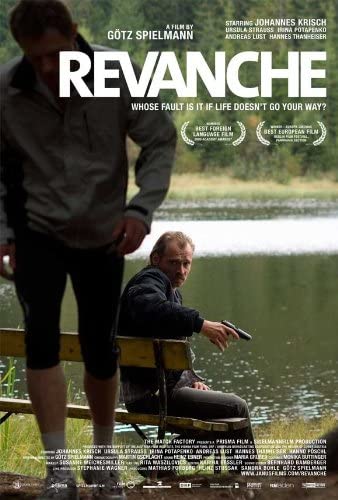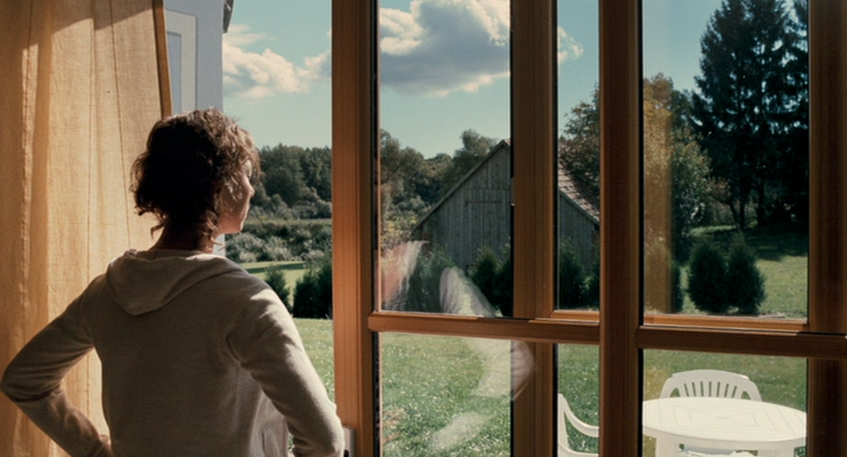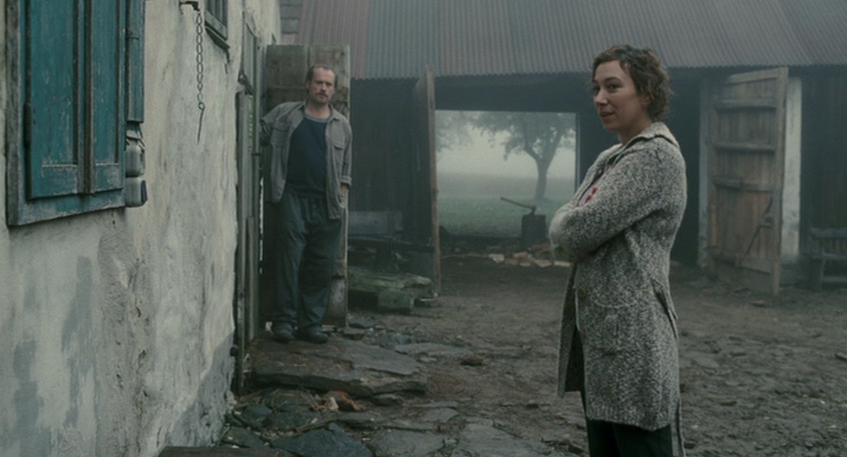

“He lives in the city. In the city you end up arrogant or a scoundrel. He ended up a scoundrel.”
If the opening scenes of Revanche don’t cause you to turn it off, you will find yourself pleasantly engrossed by the film’s intimate tale of revenge that involves a scraggly ex-con and his grandfather, a prostitute, a policeman and the policeman’s wife. Written and directed by Austrian filmmaker Götz Spielmann, the film lingers in the grey areas of internal conflict and interpersonal drama where every choice seems to be touched by evil. Though it excessively lingers on its lewd elements (probably because that is sometimes considered artful or realistic), it eventually blossoms into a captivating and precisely crafted tragedy as two disparate threads become tightly woven throughout its runtime.
As the film plays out, a balance is achieved between the beautiful and the profane, but the film begins with spades of the latter—including a smattering of nude scenes and requests for sexual acts from the working girls; one of the patrons even compliments the quality of Tamara’s (Irina Potapenko) nether regions while she performs for him. Alex (Johannes Krisch)—a burly ex-con who works as hired muscle for Tamara’s pimp—is secretly seeing her, and the two of them open the film with a long sex scene in the shower, pale white butt cheeks and all. The two of them are planning to get out of town and start a new life together. As they sit in his apartment, nude on the bed, they speak of their debts and how a simple bank robbery could pay them all off and allow them to start a new life together.

The film opens two story threads; in addition to Alex and Tamara’s get-rich-quick scheme, the world of Robert (Andreas Rust) and his wife Susanne (Ursula Strauss) is established. Outwardly, they appear to have happy lives. He is a police officer and she runs a grocery store, and they own a large house and eat nice dinners in it every night. The film carefully establishes the characters so that their faults seem genuine. Robert is shaky at the firing range but is anxious for action in the field to prove himself; Susanne informs her mother that she is not the reason that her mother does not have a grandchild, and ponders the large but empty nursery in their home.
The threads cross in two ways. First, the restless Susanne keeps herself busy by inviting her elderly neighbor to ride to church with her. The neighbor, Hausner (Hannes Thanheiser), happens to be the widowed grandfather of Alex. When Alex comes around occasionally to help the crusty old man with chores on his farm, he brushes shoulders with Susanne.
The other is the bank robbery, which goes smoothly until Alex returns to the car to find Robert questioning Tamara, who had been waiting for him in the vehicle. At this point in the film, we’ve already had enough hints to understand how the altercation will play out. Early in the film, Alex pulls an unloaded gun on Tamara as a trick, to prove to her that even the unloaded weapon will be sufficient for robbing the bank. Later, he wakes her up in the morning wearing a ski mask to cover his face.

Instead of calmly approaching the vehicle and trying to talk his way out of the predicament, Alex dons the mask again and pulls the gun on Robert. As they drive away, Robert fires a few shots “at the tires”—a phrase that he repeats ad nauseam once he finds out that Tamara was killed by one of his bullets. Spielmann’s careful planning and fleshing out of characters in early scenes gives these interactions an unplanned and credible feel, with each character’s decision remaining consistent with their previous actions.
Unnerved by Tamara’s death, Alex abandons their getaway car in the woods and hikes back to his grandfather’s farm, where he loses himself in chopping up a large pile of wood for winter. Though Hausner is surprised by his extended stay, he eventually seems content to cede some of his farm duties to the younger man, but he remains adamant that when his day comes they will have to “carry him out feet first.” Despite their uncertain past, their shared work ethic reunites the pair and allows them to build a familial bond.
As Robert’s mental state deteriorates as a result of the fatal shooting, Susanne looks for companionship elsewhere, becoming a constant presence at Hausner’s farm. One day, Alex confronts her, telling her that she is unwelcome on the farm—that they do not know one another and things are better that way. Impulsively, she invites him to her house, where she will be alone that evening while Robert works the night shift. And so begins their affair.

With careful planning, the characters have remained in close proximity without understanding the whole picture. Alex is the first to recognize their connection when he sees a picture of Robert on the wall in Susanne’s house, realizing that the woman that he is sleeping with is married to the man who killed Tamara. It isn’t until the closing moments of the film—after Alex has already questioned Robert (without betraying his own role in the ordeal) and been convinced by his guilt-ridden confessions that he was indeed aiming for the tires—that Susanne recognizes who Alex is.
Revanche presents us with opposites—city vs. country, convict vs. policeman, devout Christian vs. prostitute—but purposefully mixes the traits we associate with these things. Although Hausner dislikes Vienna and lives on his pastoral farm with his cows, he eventually gives in and lets Alex take him to the hospital. It is Alex, not Robert, who is our hero, the former running through a gamut of emotions throughout the film while the latter struggles with his grasp on sanity. Although Tamara is a prostitute, she is trying to rescue herself from that life,1 while Susanne gives herself away for free, claiming that “God will understand” her reasons for it. Even the pimp (Hanno Pöschl) tries to do some good by offering Tamara a nicer apartment in exchange for entertaining his richer clients.
There are not many stylistic flourishes, excepting the frequent use of longer takes that stand in stark contrast to the frenetic cutting of Hollywood films. Its drama and subject matter are reminiscent of Fassbinder (Ali: Fear Eats the Soul (1974), Lola (1981)) and its suspense builds similar to that of fellow Austrian filmmaker Michael Haneke (Caché, either version of Funny Games). The acting is steady, with Krisch and Strauss especially giving the film much of its emotional punch. Barring the excessive graphic depictions in the opening scenes—which may turn some guarded viewers off entirely—and a few too many repetitions of Alex “losing himself in his work,” this film is an intricately pieced together meditation on love and violence woven into a tale about conscience, regret and responsibility.
1. It is somewhat implied that Tamara, who is Ukrainian, is a victim of sex trafficking.